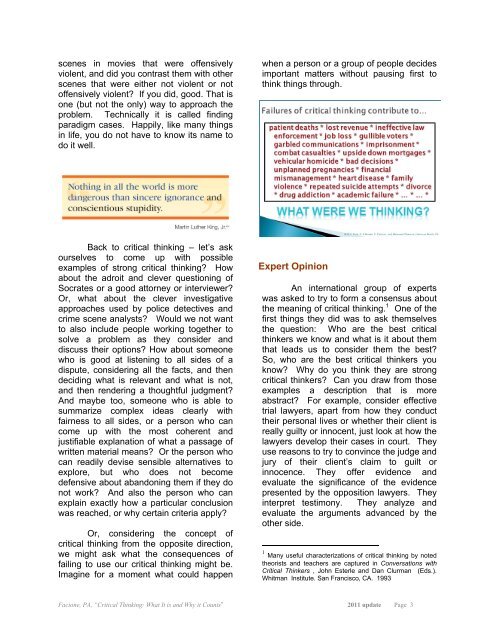Critical Thinking for Transformative Justice
Critical Thinking for Transformative Justice
Critical Thinking for Transformative Justice
You also want an ePaper? Increase the reach of your titles
YUMPU automatically turns print PDFs into web optimized ePapers that Google loves.
scenes in movies that were offensively<br />
violent, and did you contrast them with other<br />
scenes that were either not violent or not<br />
offensively violent? If you did, good. That is<br />
one (but not the only) way to approach the<br />
problem. Technically it is called finding<br />
paradigm cases. Happily, like many things<br />
in life, you do not have to know its name to<br />
do it well.<br />
when a person or a group of people decides<br />
important matters without pausing first to<br />
think things through.<br />
Back to critical thinking – let’s ask<br />
ourselves to come up with possible<br />
examples of strong critical thinking? How<br />
about the adroit and clever questioning of<br />
Socrates or a good attorney or interviewer?<br />
Or, what about the clever investigative<br />
approaches used by police detectives and<br />
crime scene analysts? Would we not want<br />
to also include people working together to<br />
solve a problem as they consider and<br />
discuss their options? How about someone<br />
who is good at listening to all sides of a<br />
dispute, considering all the facts, and then<br />
deciding what is relevant and what is not,<br />
and then rendering a thoughtful judgment?<br />
And maybe too, someone who is able to<br />
summarize complex ideas clearly with<br />
fairness to all sides, or a person who can<br />
come up with the most coherent and<br />
justifiable explanation of what a passage of<br />
written material means? Or the person who<br />
can readily devise sensible alternatives to<br />
explore, but who does not become<br />
defensive about abandoning them if they do<br />
not work? And also the person who can<br />
explain exactly how a particular conclusion<br />
was reached, or why certain criteria apply?<br />
Or, considering the concept of<br />
critical thinking from the opposite direction,<br />
we might ask what the consequences of<br />
failing to use our critical thinking might be.<br />
Imagine <strong>for</strong> a moment what could happen<br />
Expert Opinion<br />
An international group of experts<br />
was asked to try to <strong>for</strong>m a consensus about<br />
the meaning of critical thinking. 1 One of the<br />
first things they did was to ask themselves<br />
the question: Who are the best critical<br />
thinkers we know and what is it about them<br />
that leads us to consider them the best?<br />
So, who are the best critical thinkers you<br />
know? Why do you think they are strong<br />
critical thinkers? Can you draw from those<br />
examples a description that is more<br />
abstract? For example, consider effective<br />
trial lawyers, apart from how they conduct<br />
their personal lives or whether their client is<br />
really guilty or innocent, just look at how the<br />
lawyers develop their cases in court. They<br />
use reasons to try to convince the judge and<br />
jury of their client’s claim to guilt or<br />
innocence. They offer evidence and<br />
evaluate the significance of the evidence<br />
presented by the opposition lawyers. They<br />
interpret testimony. They analyze and<br />
evaluate the arguments advanced by the<br />
other side.<br />
1 Many useful characterizations of critical thinking by noted<br />
theorists and teachers are captured in Conversations with<br />
<strong>Critical</strong> Thinkers , John Esterle and Dan Clurman (Eds.).<br />
Whitman Institute. San Francisco, CA. 1993<br />
Facione, PA, “<strong>Critical</strong> <strong>Thinking</strong>: What It is and Why it Counts” 2011 update Page 3

















